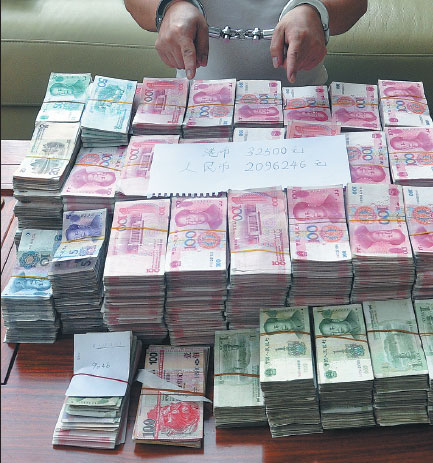China strengthens efforts to clean up 'dirty money'
Updated: 2016-08-17 07:36
By Wang Yanfei(China Daily)
|
||||||||
|
More than 2 million yuan earned via money laundering was handed over to police by a suspect at an underground bank in Guangzhou, Guangdong, in April last year. Xinhua |
Rather than being a haven for money laundering as some people believe, China does not have the fundamentals to become a hub for illegal activities, according to Jin.
China joined the Financial Action Task Force - an intergovernmental agency founded in 1989 to fight money laundering and other illegal financial activities - in 2007.
"Since then, China has been striving to meet the rising expectations of the international community," she said, adding that one significant move was the improvement of systems to track suspect capital flows through financial institutions.
Although Yan Feng and his partners dispersed their transactions across a number of banks to avoid suspicion, the Shenzhen branch of Bank of China, a commercial lender, used a new system designed to tackle money laundering and traced 183 accounts opened by the family for use in illegal foreign-exchange transactions.
Yan and his partners are now awaiting trial on money laundering charges.
"The improved systems allow local branches at the municipal level to better play their roles in the fight against money laundering," Jin, of the PBOC, said.
Last year, China launched a nationwide probe to tackle the problem, and the PBOC and other financial institutions have made combined efforts to close loopholes within the financial system to help investigators crack down on illegal activities.
Regional differences
Although banks nationwide have adopted the basic tracking systems, they have been revised by local anti-money laundering bureaus in accordance with regional differences - unlike the coastal regions, which face a greater threat of illegal cross-border transactions, the challenges facing China's underdeveloped inland regions revolve around terrorism and illegal drugs.
"Financial institutions adopt different models to detect money laundering. That's because the inland regions have seen an increased risk of money laundering related to the financing of terrorism and drug production in recent years," said Zhao Ying, deputy head of the anti-money laundering bureau at the PBOC's branch in Chengdu, the capital of Sichuan province.
For example, banks in Panzhihua, one of Sichuan's major drug trafficking routes with neighboring Yunnan province, adopt different mathematical models to identify suspected clients and transactional behavior to those used by their counterparts in the coastal regions.
- Malaysian authorities say ship carrying diesel hijacked
- Army commander: THAAD would 'easily affect' China-US ties
- Twin panda cubs confirmed born in Vienna zoo
- Four killed in boat collision in Greece
- Premier Li to receive Aung San Suu Kyi
- S Korean president names 3 new ministers for partial reshuffle

 Zhao wins China's first gold medal in men's taekwondo
Zhao wins China's first gold medal in men's taekwondo
 World's top 10 innovative economies
World's top 10 innovative economies
 Dancing, food and religion, all in a Xinjiang wedding
Dancing, food and religion, all in a Xinjiang wedding
 Men's table tennis overcomes singles loss to win team event
Men's table tennis overcomes singles loss to win team event
 China edges Brazil in volleyball quarterfinals
China edges Brazil in volleyball quarterfinals
 China's women's table tennis team sweeps gold
China's women's table tennis team sweeps gold
 Artists build sand sculptures to greet upcoming G20
Artists build sand sculptures to greet upcoming G20
 Top 10 biggest auto makers of 2015
Top 10 biggest auto makers of 2015
Most Viewed
Editor's Picks

|

|

|

|

|

|
Today's Top News
Trump outlines anti-terror plan, proposing extreme vetting for immigrants
Phelps puts spotlight on cupping
US launches airstrikes against IS targets in Libya's Sirte
Ministry slams US-Korean THAAD deployment
Two police officers shot at protest in Dallas
Abe's blame game reveals his policies failing to get results
Ending wildlife trafficking must be policy priority in Asia
Effects of supply-side reform take time to be seen
US Weekly

|

|








